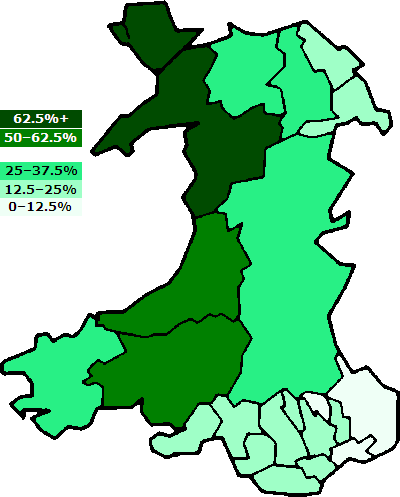Waliisisch


Jü waliisisch spräke (tjüsch: Walisisch) as en keltisch spräke, di snååked wårt önj Wales (Cymru), deeram da Waliiser ja seelew än jar spräke Cymraeg nååme. (Spreeg [kömri, kömraig]).
Maenouder snååke 750.000 manschne Waliisisch, weerfoon önj
- Wales: 611,000
- Änglönj: 133,000
- Chubut, Argentinien: 25,000
Di spräke liknet üs gåns fråmd än iir heewe da liirde miinjd, dåt wus nåån indogermaanschen spräke. Ouers duch as dideere dåt.
Di spräke gungt tum biispel sü:
Mae gath ar y gadair
[mai gath ar e gadär]
'Deer as en kåt aw e stölj.'
Deerüt hååle we füliende uurde:
mae = deer as
gath = cath = kåt; (th as in änglisch thin)
ar = aw
y = e (uk: jü, di, dåt)
gadair = cadair = stölj
Alsü fånge cath ön cadair gewöönlik önj ma C (spräägen as:[k]), mån änret ham dåt önj wase kombinasjoone tu G.
Dåt hiitj mutasjoon än spaalt önj dåt Waliisische en grut rul.
Cath as heer dåt iinjsist uurd, wåt bekånd hiirt.
En ouder seeting:
Mae’r ci yn yr ystafell.
[mai r kii en er estawäLL]
'Deer as di hün önj e dörnsch.'
Deerüt liire we:
‘r = yr = y = di (uk: jü, dåt)
ystafell = dörnsch.
Dåt leest uurd heet alsü ouer tjüsch Stube ma ST wåt bekåndet än ci kåne we wi, as we an en Kynologe ('hünetiinjer') tånke.
Dåt waliisisch LL wårt ütspräägen as L, wilt tugliks luft döör da täis gungt. Deerüt koon huum ferstönje, weeram di walisische noome Lloyd oofding as Floyd ütspräägen wårt.
En ouder biispel:
Mae ef yn eistedd; (dd=th as önj änglisch this)
'Deer as hi önj t saten' = 'Hi sat.'
Dåt liket komplitsiird, ouers eentlik as dåt önj dåt Änglische jüst iinjs:
He is sitting = ‘hi sat’ än sü uk:
Rydw i yn eistedd = I am sitting = ‘ik sat’
Rwy ti yn eistedd = You are sitting = ‘dü satst’
Aw jü wise töre fråmde ai åle forme as sat-sate-satst foon åle tiduurde tu liiren.
Huum tånkt wälj, dåt dåt deerfoon kamt, as da keltische inboogere foon Änglönj ål dåt Germaansch liire moost, as ja sunt 449 aw iinjs foon da Angele ouerhärsched wörden.
Sii uk
[Bewerke | Kweltekst bewerke]Linke
[Bewerke | Kweltekst bewerke]Text is available under the CC BY-SA 4.0 license; additional terms may apply.
Images, videos and audio are available under their respective licenses.
